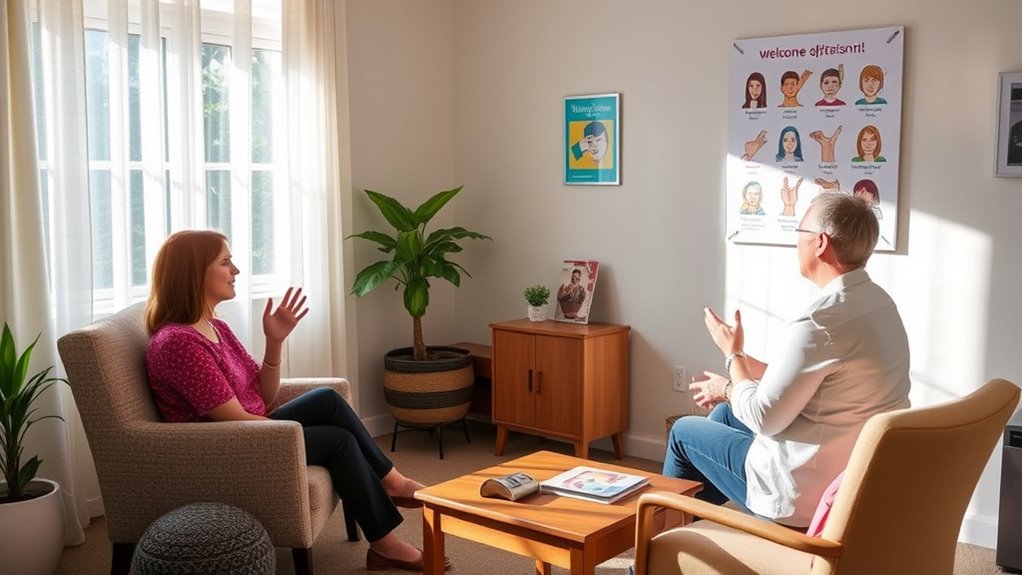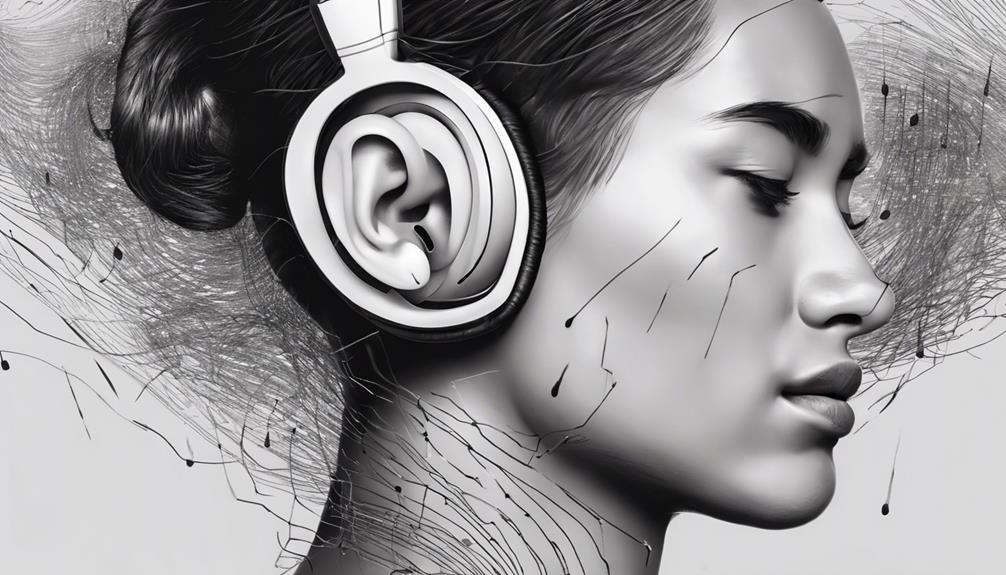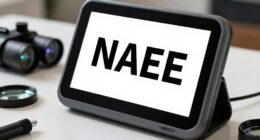To find Deaf-accessible therapists, start by using directories like NASADHH or Psychology Today, filtering for ASL fluency and cultural competence. Reach out to local Deaf community centers or advocacy groups for trusted referrals. Consider telehealth options for greater flexibility and geographic reach. Always verify therapists’ qualifications and experience working with Deaf clients. If you explore these resources further, you’ll discover additional strategies to connect with supportive, culturally competent mental health providers.
Key Takeaways
- Use specialized directories like NASADHH and Psychology Today to filter for ASL-fluent and culturally competent therapists.
- Seek recommendations from Deaf community centers, advocacy groups, and support networks for trusted providers.
- Prioritize therapists with experience working with Deaf clients and proficiency in ASL.
- Explore telehealth options for flexible, accessible therapy regardless of geographic location.
- Verify therapist qualifications, cultural competence, and comfort with your preferred communication style during initial consultations.
Understand the Importance of Cultural and Linguistic Competence

Understanding the importance of cultural and linguistic competence is essential when seeking effective therapy for Deaf individuals. When a therapist is culturally competent, they recognize and respect Deaf culture, which helps build trust and rapport. Incorporating knowledge of home improvement strategies such as creating a supportive environment can further enhance communication and understanding in therapy sessions. Many Deaf clients, about 72%, prefer working with therapists who are fluent in ASL and understand their cultural background. This competence allows therapists to navigate communication barriers and address unique challenges related to identity and community. Therapists with cultural awareness are better equipped to adapt their approaches to meet the specific needs of Deaf clients. When you find a culturally and linguistically competent therapist, you’re more likely to feel understood and supported. They create a safe, affirming environment that promotes emotional well-being and personal growth. Prioritizing cultural competence ensures your therapy experience is respectful, effective, and truly tailored to your needs.
Use Specialized Directories and Community Resources to Find Qualified Providers

To find qualified deaf-accessible therapists, start by utilizing specialized directories and community resources designed to connect you with experienced providers. Websites like NASADHH list state-specific agencies and therapists working with deaf people. Platforms such as Psychology Today allow you to filter licensed mental health providers who specify ASL fluency and cultural competence. Local deaf community centers can also offer trusted referrals to therapists familiar with issues related to Deaf and Hard of Hearing individuals. Exploring online directories tailored for the deaf community helps you find culturally and linguistically appropriate therapy services. Additionally, checking for vetted providers ensures you receive safe and effective care.
Connect With Deaf-Centered and Sign Language-Savvy Therapists

Connecting with Deaf-centered and sign language-savvy therapists guarantees you receive mental health support that truly resonates with your cultural and linguistic needs.
Many Deaf individuals prefer working with counselors who communicate fluently in ASL, as this guarantees clear understanding and cultural affirmation.
Use directories like NASADHH to find therapists experienced in providing Deaf-centered, sign language-accessible services.
Certified Deaf therapists often have specialized training in Deaf culture and ASL, making therapy more meaningful and effective.
When searching, look for providers who explicitly state their experience with Deaf clients and their ability to offer services in ASL.
Connecting with these therapists helps you access culturally affirming care that respects your identity and communication preferences, fostering a more comfortable therapeutic environment.
Explore Telehealth Options for Greater Accessibility
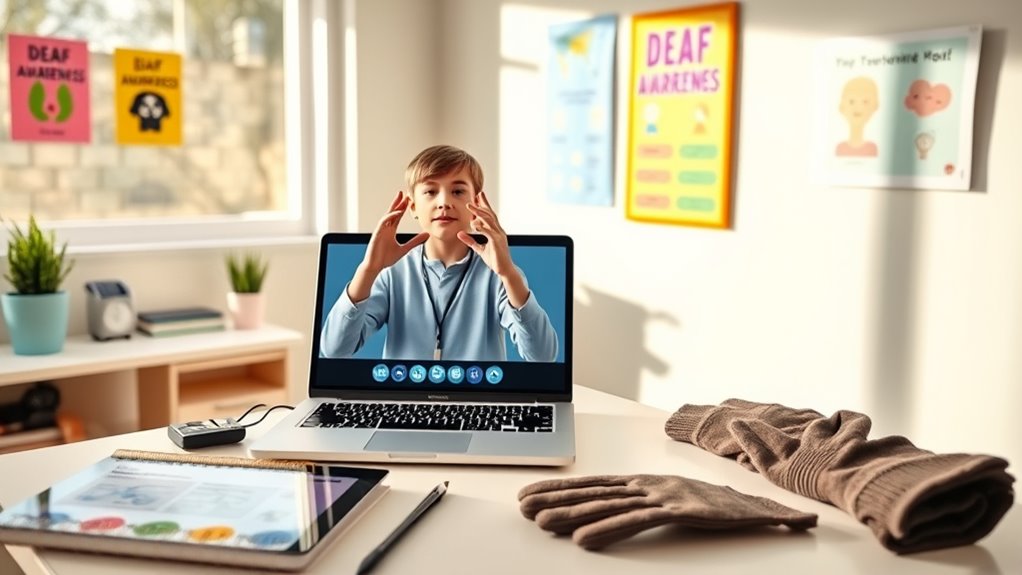
Telehealth makes it easier for you to access therapy sessions from anywhere in Texas, including remote areas, with secure video platforms. Many therapists now offer online appointments in ASL, ensuring culturally and linguistically appropriate support. With flexible scheduling and expanded reach, telehealth reduces barriers and keeps your mental health care consistent. Holistic approaches are increasingly integrated into telehealth services, promoting overall well-being beyond just mental health. Additionally, telehealth can facilitate deaf-friendly communication, making therapy more accessible and effective for deaf clients. As technology advances, the integration of AI in Education can further personalize and improve therapeutic experiences for deaf individuals. Emphasizing accessible healthcare ensures all clients receive equitable support regardless of location or communication needs. Moreover, the use of telehealth technology continues to evolve, offering new tools to enhance communication and engagement for deaf and hard-of-hearing patients.
Convenient Online Appointments
Online appointments offer a level of convenience that traditional in-person therapy often can’t match, especially for deaf clients. With telehealth, you can access therapy in ASL via video-based platforms, making communication easier and more comfortable. Many services connect you with licensed, culturally competent therapists regardless of where you live, removing geographic barriers. Over 70% of deaf clients prefer telehealth because communicating in ASL from home feels more natural and less stressful. Online therapy also eliminates logistical challenges like transportation and scheduling conflicts, allowing you to maintain regular sessions. Certified deaf-friendly platforms often use secure videophone technology and flexible appointment times, fitting easily into busy schedules. Additionally, the use of telehealth technology has expanded rapidly, providing more options tailored to deaf individuals. This combination of accessibility and convenience makes online therapy a practical, effective option for your mental health needs. Embracing accessible communication methods enhances the overall therapy experience and ensures your needs are fully supported. Moreover, advancements in AI-driven solutions are helping to develop more intuitive and effective communication tools for deaf users. Incorporating deaf culture into therapy practices further improves the relevance and comfort of treatment. Recognizing the importance of cultural competency ensures that deaf clients receive respectful and effective care tailored to their unique experiences.
Expanded Geographic Reach
Because distance can be a significant barrier to accessing quality mental health care, telehealth opens up new possibilities for Deaf individuals across Texas. With online therapy services, you can connect with licensed therapists no matter where you live. Many providers now offer sessions in ASL through secure digital platforms, making it easier to find culturally and linguistically appropriate care. Digital communication tools have become more advanced and reliable, ensuring a seamless therapy experience. Additionally, video conferencing technology has improved to support clear, sign-language communication with minimal lag or technical issues. The integration of end-to-end encryption further enhances the security and privacy of your sessions, giving you peace of mind. Telehealth not only broadens your options but also reduces travel time and costs, making ongoing support more practical. This flexibility allows you to work with specialists who mightn’t have local offices, ensuring you receive the highest quality care without geographical limitations. Ongoing technological advancements also contribute to increasing the safety and reliability of telehealth platforms, helping protect your privacy and sensitive information.
Flexible Scheduling Options
Flexible scheduling options substantially enhance access to mental health care for Deaf individuals, allowing you to choose appointment times that fit your busy life. Telehealth makes it possible to access therapy from home, eliminating transportation barriers and expanding your options.
Many Deaf-friendly therapists offer evening and weekend appointments via video conferencing, so you can find a time that works best for you. Online therapy platforms often provide flexible session times, making it easier to integrate mental health support into your daily routine.
Additionally, telehealth uses secure video and ASL communication, ensuring culturally and linguistically accessible care. This adaptability means you can prioritize your mental health without sacrificing your busy schedule or comfort. Efficient General Ledger Coding can further streamline administrative processes, making mental health services more accessible by reducing paperwork burdens. Incorporating telehealth technology can also enhance the overall experience by providing real-time, accessible communication options, which is especially important for ensuring culturally accessible care. The growing availability of remote scheduling further supports flexibility, allowing clients to select appointment times outside traditional hours to better suit their needs. To maximize these benefits, providers are increasingly adopting tuning strategies to better meet the unique needs of Deaf clients, ensuring a supportive and effective therapeutic environment.
Verify Qualifications, Experience, and Areas of Expertise
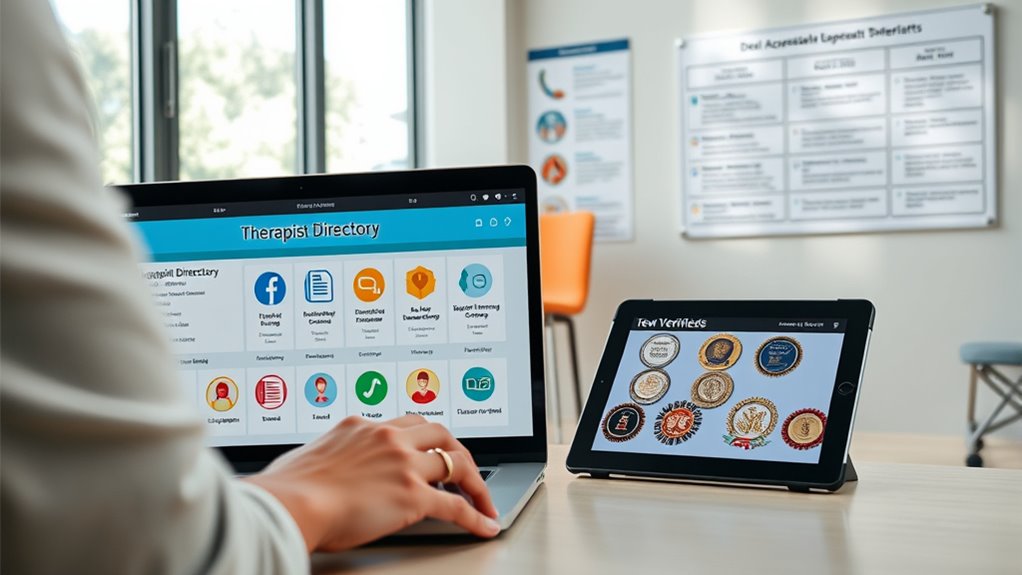
To guarantee you find a qualified Deaf-accessible therapist, start by verifying their licensure in mental health fields like LPC, LCSW, or Psychology through reputable directories such as Psychology Today. Make certain they list experience working with Deaf clients and proficiency in ASL, which is often highlighted in their profiles or bios. Confirm their areas of expertise, such as trauma, anxiety, or depression, to ensure they match your specific needs. Use directories and organizations like NASADHH or Deaf therapy networks to find specialists with experience serving Deaf communities. Don’t hesitate to contact potential therapists directly to ask about their cultural competence and experience providing accessible, ASL-based mental health services. This step guarantees you select a provider who’s both qualified and equipped to meet your unique communication needs. Additionally, understanding Deaf culture and communication styles can help you assess whether a therapist is truly able to provide culturally sensitive care tailored to Deaf clients.
Consider Different Therapy Approaches and Delivery Formats
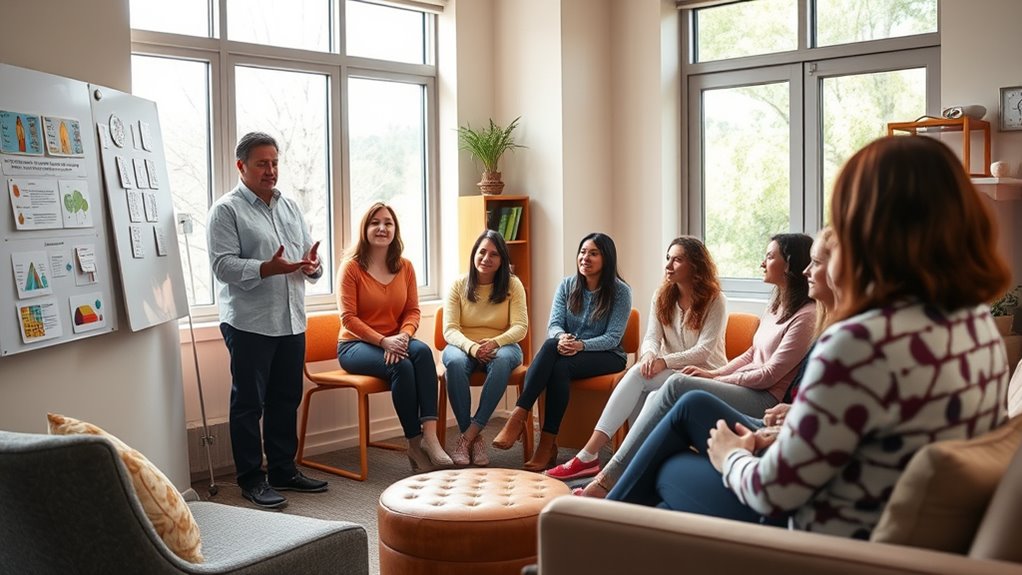
When choosing a Deaf-accessible therapist, it’s important to contemplate the different therapy approaches and delivery formats available, as these can considerably impact your comfort and progress. Many therapists use American Sign Language (ASL) and culturally sensitive methods tailored to Deaf clients’ needs.
Therapy can be delivered in several formats, such as in-person, online via videoconference, or through hybrid models, making therapy more accessible.
Evidence-based techniques like Cognitive Behavioral Therapy (CBT), EMDR, and social-emotional therapy are common and effective options.
Telehealth expands access for those in remote or underserved areas, often providing the same quality of care.
Some providers also offer specialized services like group therapy, family counseling, or crisis intervention suited to diverse Deaf community needs.
- Choose formats that suit your comfort, whether in-person, virtual, or hybrid
- Look for approaches that respect Deaf culture and use ASL
- Consider specialized services like group or family therapy
Assess Compatibility and Comfort in Initial Consultations

When you meet with a potential therapist, make sure to clarify your communication needs and ask about their experience with Deaf clients.
Pay attention to how comfortable and respected you feel during the conversation, as these are essential for trust.
Discuss their understanding of Deaf culture and confidentiality to guarantee a good fit for your unique preferences.
Clarify Communication Needs
How can you guarantee that your communication preferences align with your therapist’s skills from the start? Begin by clearly stating your preferred mode of communication—such as ASL, written English, or gestures—during the initial consultation. Verify the therapist’s experience working with deaf clients and their comfort with your chosen communication style.
Ask about accessible technologies like videophones or video conferencing to ensure effective communication. Discuss your comfort level with their communication approach and confirm they respect Deaf culture and your preferences.
Consider scheduling a brief intro session to test compatibility before committing to ongoing therapy. This proactive step helps you find a therapist who truly meets your communication needs.
- Clearly express your communication preferences upfront
- Confirm the therapist’s experience with deaf clients
- Discuss accessible technology use
Discuss Cultural Understanding
To guarantee your therapist truly understands and respects Deaf culture, start by asking about their experience working with Deaf clients and their familiarity with Deaf community norms.
Find out if they’re fluent in ASL and comfortable communicating through sign language, as this ensures respectful, effective care.
Inquire about their approach to cultural competence—how they incorporate Deaf culture and community awareness into therapy sessions.
Watch for signs that they respect Deaf identity and avoid stereotypes or assumptions.
It’s also helpful to see if they’re open to ongoing conversations about your cultural needs and willing to adapt their methods to support your unique identity.
This initial dialogue helps you assess whether they’re genuinely aligned with your cultural values and communication preferences.
Evaluate Comfort Level
During your initial consultation, it’s vital to observe whether the therapist communicates fluently in ASL and demonstrates genuine cultural competence with the Deaf community. Pay attention to how comfortable you feel sharing personal details and whether the therapist’s communication style matches your needs.
Ask about their experience working with Deaf clients and how they adapt therapy to Deaf culture. Use this session to gauge if you feel understood, respected, and at ease.
Also, consider whether the environment or virtual platform is accessible and welcoming to your communication preferences. Your comfort and sense of safety are essential for effective therapy.
- Notice if the therapist’s communication style aligns with your needs
- Ask about their experience with Deaf clients and cultural adaptation
- Assess if the environment feels accessible and respectful
Utilize Support Networks and Advocacy Groups for Recommendations

Leveraging support networks and advocacy groups can be an effective way to find deaf-accessible therapists who meet your needs. Organizations like the National Deaf Center provide resource lists and referral services, making it easier to identify qualified professionals.
Your connections within the Deaf community can also offer personal recommendations based on their experiences with specific mental health providers.
Many agencies focused on Deaf services partner with mental health organizations to ensure culturally and linguistically appropriate care.
Additionally, online Deaf advocacy groups and social media platforms like Facebook and Instagram frequently share directories and updates about deaf-friendly therapists.
Connecting with local Deaf clubs or community centers can lead to trusted referrals from those who understand your unique needs and can guide you toward experienced, accessible professionals.
Frequently Asked Questions
How Do Deaf People Get Therapy?
You might wonder how Deaf people get therapy. They typically find Deaf-friendly providers who communicate in ASL and understand Deaf culture, either in-person or through telehealth.
Many use directories like Psychology Today or NASADHH to locate licensed professionals with experience working with Deaf clients.
Video platforms and hotlines also connect them to accessible therapists and crisis support.
Some prefer working with Deaf therapists for better cultural and linguistic understanding, making therapy more effective and comfortable.
How to Counsel Someone Who Is Deaf?
When counseling someone who’s deaf, first foster a friendly, fun, and flexible environment. Focus on clear communication by using sign language or visual aids, and listen actively to understand their unique needs.
Facilitate a safe space where they feel seen and supported. Be patient, respectful, and prepared to adapt your approach, ensuring cultural competence and comfort.
How to Deal With Deaf Clients?
When working with deaf clients, you should prioritize building trust and understanding their communication preferences. Use culturally competent, ASL-fluent techniques, and respect their cultural values.
Incorporate accessible tools like videophones or in-person ASL sessions. Continuously adapt your approach to meet their emotional, social, and linguistic needs.
What Can the Government Do to Help Deaf People?
The government can help deaf people by funding accessible mental health services, mandating insurance coverage, and promoting awareness. They can train more ASL-fluent therapists, create national directories of deaf-friendly providers, and invest in telehealth technology.
Conclusion
Finding a deaf-accessible therapist is like opening a door to understanding in a quiet room. While resources and specialized providers build the foundation, your comfort and connection fill the space with trust. By combining expert guidance with your intuition, you create a safe environment where healing can flourish. Remember, it’s not just about finding a therapist—it’s about creating a partnership that respects your identity and supports your journey.

